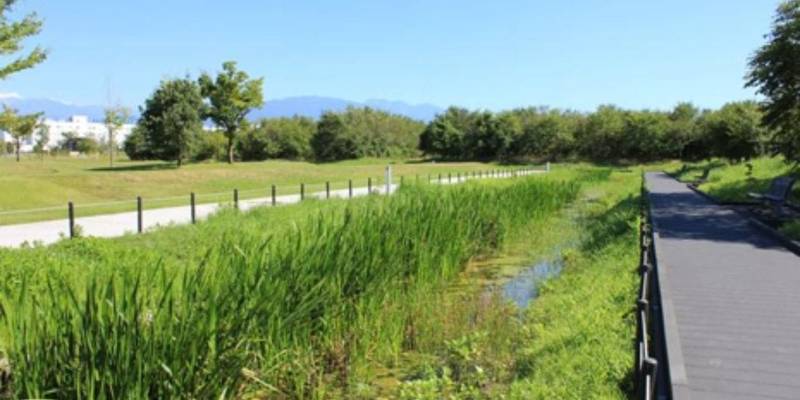[Kurobe City, Japan, November 7, 2023] — Furusato-no-Mori (Hometown Forest), which was established within the Kurobe Manufacturing Center (Kurobe City, Toyama Prefecture) of YKK Corporation (Head Office: Chiyoda-ku, Tokyo / President: Hiroaki Otani), was designated a Nature Coexistence Site1 by Japan’s Ministry of the Environment. Of the 122 sites (in 35 prefectures) certified for the first half of FY2023, the first year of the program, two sites in Toyama Prefecture, including Furusato-no-Mori, were certified. The award ceremony was held in Tokyo on October 25.
The Kurobe Manufacturing Center is making efforts to encourage and advance coexistence with nature, as defined in the “YKK Group Environmental Vision 2050”2. The goal is to create a “factory in a forest” envisioned by YKK founder Tadao Yoshida by planting 20,000 saplings of 20 species native to Kurobe City and restore the forests and waterside areas on the Kurobe River alluvial fan by the time of the company’s 100th anniversary in 2034.
Elements That Contributed to the Designation
• Works toward the conservation of living creatures, informed by an understanding of the topography of the Kurobe River alluvial fan, the river environment, etc.
• Has implemented measures against non-native species and the genetic makeup of the area, such as banning the planting and release of non-native species for the purpose of genetic conservation
• Engages in independent and regular monitoring efforts in the form of biological surveys (once every four years) and tree surveys (once a year)
• Used as a site for environmental education
In August of last year, YKK also joined the “30 by 30 Alliance for Biodiversity”3
. The aim of the alliance is to establish a mechanism through which to achieve the international target of conserving at least 30% of land and ocean environments as healthy ecosystems. The designation of Furusato-no-Mori (Hometown Forest) as a Nature Coexistence Site is part of YKK’s efforts toward this goal, and moving forward, the company will continue working toward the achievement of these international targets and the realization of a sustainable society.
YKK Center Park Furusato-no-Mori (Hometown Forest) – Overview
In the past, the Kurobe River alluvial fan had been dotted with small forests and waterside areas that were home to a wide variety of creatures. In an effort to combat the deterioration of the area’s natural environment, YKK’s Kurobe Manufacturing Center began in 2006 to collect the seeds of trees native to the Kurobe River alluvial fan and plant them. Thanks to the work of many employees and members of the local community, a total of 20,000 trees of 20 different types were planted from the years of 2008 to 2012. Since, the center has maintained a purposely hands-off approach, observing the changes to the forest through periodic measurements of tree height and biological surveys. A biological survey conducted in 2019 showed that there were 318 species (including 26 species that are considered endangered in Japan and in Toyama Prefecture) living in the area.
Furusato-no-Mori (Hometown Forest) has also been made available to the public as YKK Center Park, along with an exhibition facility for industrial tourism. The park is also used as a site for environmental education, hosting events for children such as the observation of land/aquatic creatures, and wood board/sign crafting and installation.
[Location] Within YKK Center Park, 200 Yoshida, Kurobe City, Toyama Prefecture
[Area of Designated Site] 32,400 square meters
[Access] Approx. 10-minute drive from Kurobe Station (Ainokaze Toyama Railway)
Approx. 15-minute walk from Ikuji Station (Ainokaze Toyama Railway)
https://visit-toyama-japan.com/en/places-to-go/51020
About YKK
YKK solves the most complex fastening and attaching challenges. Since the company’s founding in Tokyo in 1934, YKK has continuously set industry standards for quality, innovation, and sustainability in the production of zippers, plastic hardware, hook and loop fasteners, webbing tapes, and snap and buttons. YKK’s “solutions-first” approach leverages its extensive product and machinery portfolio, engineering expertise, and integrated production, service, and supply chain solutions in 70+ countries/regions, leaving it well-positioned to support the growth of customers
of all sizes and adapt to their evolving business needs. Guided by the CYCLE OF GOODNESS® philosophy – no one prospers without rendering benefit to others – YKK aims to contribute to a sustainable society through its products and manufacturing operations and constantly seeks new ways to serve the changing needs of its customers while at the same time investing in its employees and giving back to its communities.

